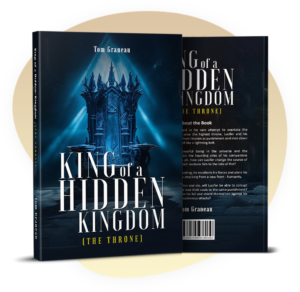In King of a Hidden Kingdom: THE THRONE, Adam and Eve play a central role in the spiritual and narrative conflict that defines the story. As the first humans, their creation represents God’s ultimate act of love and trust, while their fall becomes a focal point for the cosmic battle between good and evil. This blog explores how Tom Graneau positions humanity as both the prize and the battleground in the ongoing struggle between divine justice and Lucifer’s rebellion.

Humanity’s Divine Origin
Adam and Eve are introduced as the pinnacle of God’s creation, uniquely formed in His image and given dominion over the Earth. Graneau emphasizes their special status, portraying them as beings of innocence, purity, and autonomy. Their relationship with God is personal and direct, symbolized by their walks with Him in Eden.
For Lucifer, humanity’s creation is both an insult and a threat. Cast out of Heaven and stripped of his former glory, he perceives Adam and Eve as God’s new favored beings. Their free will—a gift denied to angels—further fuels his resentment. Lucifer’s rebellion takes on a new dimension as he targets humanity, seeing them as a means to strike at God.
The Battle for Humanity’s Allegiance
Adam and Eve’s role in the cosmic battle is rooted in their capacity for choice. Graneau frames humanity as the ultimate expression of free will, capable of obedience or rebellion. This autonomy makes them a focal point in the conflict between God and Lucifer.
Lucifer’s strategy to corrupt humanity reflects his understanding of their nature. By appealing to their curiosity and desire for knowledge, he exploits their vulnerability. The forbidden Tree of Knowledge becomes the battleground for this struggle, symbolizing the tension between divine command and human independence.
The Ripple Effect of Their Choices
The consequences of Adam and Eve’s choices extend far beyond Eden. Their disobedience introduces sin into the world, altering the course of human history and deepening the cosmic conflict. Graneau portrays their fall as a turning point, where humanity transitions from a state of innocence to one of moral struggle.
Their actions also solidify Lucifer’s role as the adversary. By corrupting humanity, he establishes his influence over the physical world, turning it into a new arena for his rebellion. The structured cities of Hell, designed to house souls based on their sins, underscore the ripple effect of Adam and Eve’s fall.
Humanity as the Fulcrum of Redemption
Despite their fall, Adam and Eve remain central to God’s redemptive plan. Graneau’s narrative suggests that their creation, fall, and potential for reconciliation are all part of a larger divine purpose. Humanity’s free will, though exploited by Lucifer, becomes the means through which God’s love and justice are ultimately revealed.
The story of Adam and Eve is a testament to humanity’s enduring significance in the cosmic battle. It highlights their dual role as both the battleground for spiritual conflict and the recipients of divine grace.
A Reflection on Purpose and Potential
Graneau’s portrayal of Adam and Eve invites readers to reflect on their own role in the spiritual conflict. Humanity’s capacity for choice is both a privilege and a responsibility, emphasizing the importance of aligning with divine purpose. Through the story of Adam and Eve, King of a Hidden Kingdom underscores the power of free will, the consequences of disobedience, and the enduring hope for redemption. In the grand narrative of creation and conflict, humanity remains at the center—a reminder of both their vulnerability and their potential for greatness.